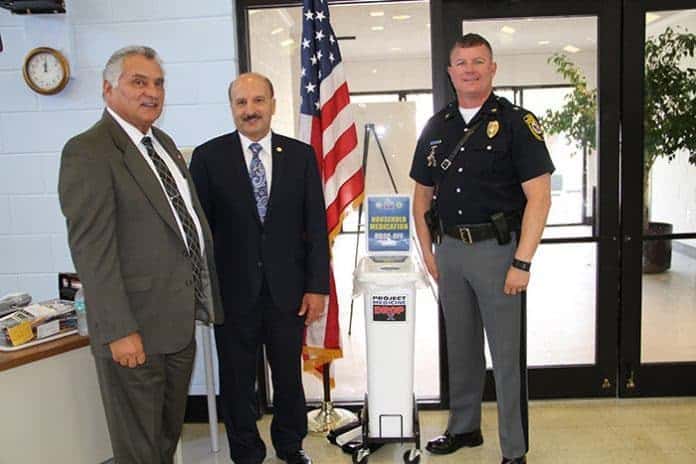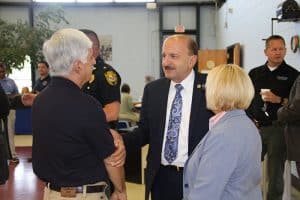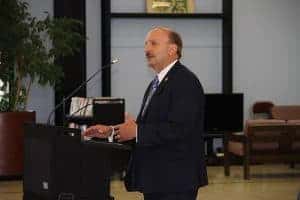
STAFFORD – Heroin mixed with fentanyl has become a deadly concoction, and police said that the best way for everyday people to fight this epidemic is to drop off unused prescriptions in designated areas.

The Ocean County Prosecutor’s Office records numbers of overdoses and Narcan reversals. Narcan is a chemical spray that first responders and school districts have that can cancel the effects of an overdose. According to their figures, this is the status of the opioid epidemic in Ocean County:
- 2012: 53 overdoses.
- 2013: 112 overdoses.
- 2014: 101 overdoses. The county began using Narcan in April, and had 129 reversals.
- 2015: 118 overdoses. 272 Narcan reversals.
- 2016: 209 overdoses. 502 Narcan reversals. The number of overdoses is higher than previously reported, because earlier articles were published before the toxicology investigations were done on some deaths.
- 2017: 84 overdoses. 201 Narcan reversals. This number is accurate as of August 1. Similarly, this number might go up after toxicology results are in.
It also means that in the first 185 days of the year, there has been approximately one death every two days.
In an effort to get unused medications away from drug dealers and addicts, the county has collected 12 tons of prescriptions since the program began in 2013, Ocean County Prosecutor Joseph Coronato said. For many, the use of heroin starts with the abuse of prescription medications.
The goal is to get these medications off the streets so that they can’t be used or sold, he said during a presentation at the Southern Service Center in Stafford Township.
“It may not seem like a lot,” to drop off medications. However, some medications have a street value of up to $40 a pill.

Several municipalities have drop-off boxes where you can dispose of your medications any day. Call your local government to find out when and where you can drop off your unused prescriptions. Officials have said that dumping them in the toilet or in the garbage is not safe because the chemicals eventually get into the drinking water.
“Law enforcement can’t do this all by itself,” he said.
“It all starts with prescription pills,” he said. People enter your house for any number of reasons. Either they are there to work as a contractor, or maybe you are selling your house and a realtor brings a potential client in. These people ask to use the bathroom. “They’ll take a few pills from the medicine cabinet and you wouldn’t even know.”
Freeholder Director Joseph Vicari told the group assembled that he knows how they feel. He’ll get a prescription and hold onto it. “Then six months later I can’t remember what it’s for.”
These pills stay in a home for years, and no one will even know if they go missing, he said.
The impact of a drug addiction spreads beyond just the addict, he said. Friends, families, co-workers, and others in that person’s circle of influence are affected.
“Drugs don’t have an impact on one person but the whole family,” he said.
Stafford Mayor John Spodofora continued on that idea. While the number of deaths attributed to overdoses is staggering, there are other figures that are not as well known. Injuries, suicides, and robberies to fuel a drug habit are hard to count.
“This is a war. This is an actual war,” he said. “If you see something wrong, if something looks suspicious, feel free to contact the police department.”
He thanked seniors for turning in their medications, and urged them to tell their friends and family to do so, as well. He asked that they not get flushed or thrown in the garbage, because then the chemicals will find their way back to the drinking water supply. Stafford town hall on Bay Avenue has a drop off location.

Stafford Police Chief Thomas Dellane said it was rewarding to see all the medications come in, because it means that there’s less out there for people to steal. He also noted that on occasion the police come out to communities to make collections.
The police have changed their tactics over the years, he said. A lot has changed since the “war on drugs” in the 1980s. “We thought we could arrest people and throw them into jail and thought it could end the supply chain,” he said, noting that it does not work that way.
Enforcement and arrests remain a key principle, but there are two more elements that are just as important, he said. The first is education – going into schools and other places and letting people know how dangerous this is.
While education aims to stop people from starting, treatment – the third principle – is designed to help people who are already addicted.
Having a licensed social worker available to the police to make referrals for people to go into special programs has helped a lot of people, he said. It does more than just arresting someone who was doing something wrong. It breaks up the cycle of behavior that would cause that person to continue to commit crimes. It has also saved an estimated 400 hours of police work in responding to repeat offenders.
“It’s better than putting a Band-Aid on it,” he said.







